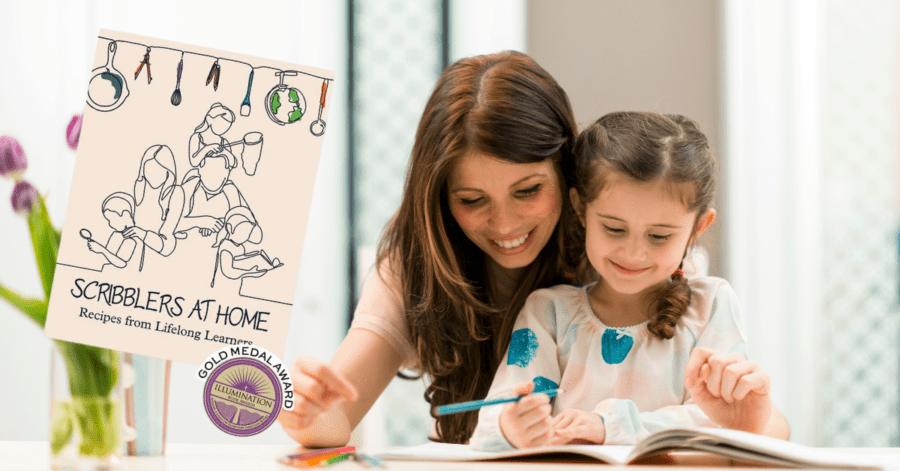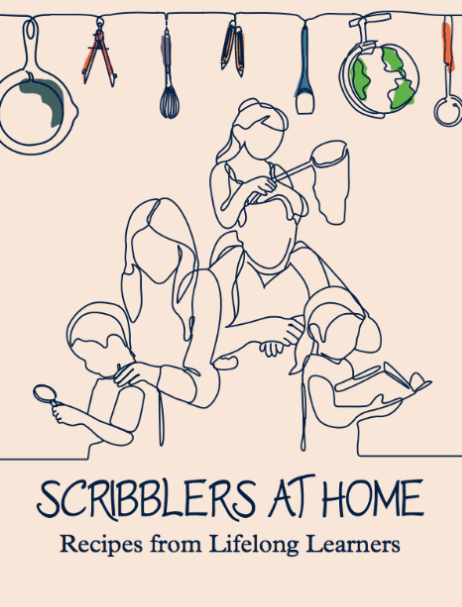We’re thrilled to announce that Scribblers at Home: Recipes from Lifelong Learners has been awarded the gold medal in education by the Illumination Book Awards! This prestigious recognition shines a light on the very best in Christian publishing, and we’re so grateful to the judges for acknowledging the work we poured into creating this preschool resource.
But beyond the award itself, there’s a deeper joy—the validation that Scribblers at Home empowers the real heroes of a child’s education: you, the parents.
To gain further insights into both Scribblers at Home and the Illumination award, we had the privilege of interviewing one of the masterminds behind this curriculum, lead curriculum developer—and host of the Everyday Educator podcast—Lisa Bailey.
Click here to jump to the interview!
The Illumination Book Awards: Shining a Light on Excellence
The Illumination Book Awards celebrate the very best in Christian publishing. Each year, esteemed judges selected from the fields of ministry, education, and publishing evaluate books across a variety of categories and recognize outstanding works that inspire, educate, and uplift readers.
Winning a gold medal is a distinct honor, and we’re incredibly grateful to the judges for acknowledging the value of Scribblers at Home.
Scribblers at Home: Recipes from Lifelong Learners
So, what exactly is Scribblers at Home? Scribblers is an early education curriculum resource designed for parents with preschool through elementary school-aged children that promotes literacy, numeracy, and curiosity through a family rhythm of play.
In other words, Scribblers at Home offers recipes for learning through fun activities.
These recipes encompass a range of subjects—from art to science—while promoting development within the grammar stage of the classical education model. This stage, typically occupied by children up to age twelve, recognizes their natural ability to absorb information and their love of repetition.
Scribblers at Home leverages this by providing engaging activities that introduce core concepts in a variety of subjects. Through play and exploration, children build a strong foundation in language skills, basic math concepts, historical figures, and scientific exploration—all while having a blast!
Ultimately, Scribblers isn’t about ticking boxes or even getting “school ready.” Rather, Scribblers is about fostering a lifelong love of learning.
Interview with Lead Curriculum Developer Lisa Bailey
1) First of all—congrats on winning the Illumination Book Award! What does this award mean to you and the curriculum development team?
We are thrilled to be recognized for providing an innovative resource for parents of young children who want education to be a natural part of what the family does together. We were so excited about the book as it came together, and were eager to share what felt like “the missing piece” of beginning education with families.
2) So, the Illumination Awards focus on Christian books. How does Scribblers incorporate a Christ-centered worldview in a way that’s accessible to young children?
We at Classical Conversations Multimedia believe that the purpose of education is to know God and to make Him known; everything we do with our children should point them to the Lord. We know that the best way to love God is to know God, and the best ways to know Him are through His Word and His world. So, our activities draw families (children and parents) into exploring creation and into conversations that encourage virtue and growing in Christ-likeness.
3) I love that! Scribblers at Home won the gold medal in the Education category. Can you describe how Scribblers, as a resource for parents, helps foster a love of learning?
Children are natural learners! They are naturally curious, naturally observant, naturally repeaters (“Do it again!”), naturally expressive, and naturally storytellers. Play encourages our kids to express their needs to move, to explore, to make sense of the world, to laugh, to sing. When we play with intention, we guide our kids to build skills they’ll use for all of life to learn about . . . anything! If learning is fun and satisfying, and, if we chase our children’s curiosity with them, they will love learning as a family. I truly believe they will be “addicted” to learning for life!
4) Speaking of learning, Scribblers is rooted in the classical model of education. What are some of the unique features of Scribblers that make it a valuable tool for parents who want to introduce their children to classical education?
The classical model demonstrates that we learn best within relationship, guided by a caring mentor to build a foundation of knowledge that we can then talk about in community. As we dialogue about ideas, we connect our bits of knowledge in ways that make the world more understandable. That understanding moves us to dig even more deeply into what we see, think, and believe. Scribblers gives parents ideas for play and conversation, reading and exploring that encourage them to become lead learners in the home, guiding their children to know and understand the world. Scribblers has lots of helps for parents included with all the “intentional play” suggestions that kids will love.
The robust introduction encourages families to consider what kind of family atmosphere they want to build and how they will learn together. It spells out some foundational habits of learning that we all can use to learn anything for life. Then, each section has an introduction that shows parents the “why, what, and how” of each “subject”: Why study poetry? What should be included? How to become a poet? Included in each “recipe” are extra thoughts, “Tips and Hints,” that will help parents see where the skills they are building with their young children are leading as they develop understanding and become more sophisticated learners.
5) Interesting! I think many of us have this notion of classical education as being rather “intellectual” and somewhat distant, but this approach sounds really practical and immediate. So, on a related note—while Scribblers is designed for pre-K and kindergarten-age children, can you elaborate on how older children might also benefit from using this resource?
Almost every activity presented in Scribblers can be scaled for older children (or even teens); suggestions are given on how to use more complex stories or give the older game participants more detailed jobs. Alongside each activity is presented a chart; these charts are really for the parents or other lead learners. They show where the learning is going next—how the skills practiced in the activity will prepare the way for the learning a junior high or high school student will eventually embrace. These charts are an excellent way for parents to redeem their own education and a great resource for older students looking for “review”!
6) The title of the book is really fun! Scribblers at Home: Recipes from Lifelong Learners. Where did that come from?
When Scribblers was a gleam in the eye of CC’s founder, Leigh Bortins, she thought it might be fun to use the metaphor of recipes. After all, everyone cooks, and most people enjoy “trying something new”—especially if they have a recipe! We also wanted people to know that, just like a cookbook, our Scribblers book does not have to be read in order or even cover-to-cover. Of course, we think everyone should read the introduction to see what’s what, but then! Well, you can pick and choose: pick one recipe/activity a day or a week, or try a bunch all at once. They can be used over and over, combined, or even tweaked to your own taste.
7) Let’s explore the cookbook metaphor some more. The concept of “recipes” in the title suggests a structured approach, right? Can you explain how Scribblers provides guidance for parents? Does it still allow for flexibility and personalization?
A recipe tells you what you need to gather before cooking, how long it might take to complete the recipe, the steps to take to make your dish, and what you will have when you’re all done. Scribblers’ recipes do that same thing! We tell you what items you need to do each activity, how long it might take, the step-by-step instructions, and what you’ll gain from doing the activity. Of course, just like a cookbook, you don’t have to try all the recipes, and for certain not in a specific order. The activities are arranged by “subject,” and families can pick and choose among and between 108 activities, including those in literature, phonics, history, arithmetic, Latin, science, and Bible. We’ve also included a poetry section to encourage families to enjoy rhymes, jokes, counting stories, and songs together.
8) Anyone who’s been following this release has probably heard at some point or another that Scribblers is built around the idea that “play is the work of childhood.” What does that mean, and how is it reflected in the resource?
Have you watched little children at play? Their movements often seem so random, so undirected, so purposeless. Maybe they’re moving a block around and around the room, or sporadically making clicking sounds while marching, or taking everything out of one cabinet for no good reason! But they are learning while they move and hum. They are finding out what their bodies can do, and what things will do, and how things fit together. They play by imitating us, and by laughing with us, and by reading stories with us, and by playing music with us, and by moving through their world. And as they move and read and laugh and sing, and listen, they collect experiences that teach them about the world and about other people.
Most parents love to play with their children but think learning should look different! We think it might not need to look so different; playing with intention is what Scribblers is all about. We’ve designed activities that children will love (We sing! We read! We march! We act silly! We go outside!) and we show parents what skills they are building as they play with their children. We help parents feel good about the family culture of fun and learning they are building together.
9) Some parents might feel overwhelmed by the idea of introducing classical education at home to such young children. How can Scribblers help alleviate those concerns and show families the power and utility of the classical model?
Read the introduction! Scribblers was written by experienced homeschool moms who wanted to give younger moms and dads what they themselves longed for. Our counsel? Slow down, love your kids, decide what your family values and then think about “education.” Many moms and dads of young ones get to the end of each day and think: “But what did we really do all day??? Was that enough???” The Scribblers answer is this: If every day you Prayed together, Played together, Read together, Explored together, and Served together, it was a good day!
The Skills of Grammar-Naming, Attending, Memorizing, Expressing, and Storytelling—come super naturally to children, and to their parents. Honestly, it is how we all learn in the beginning! The recipes in Scribblers help parents learn to incorporate these Five Core Habits into all their activities. The classical model is about building a foundation of knowledge within relationships; it is more about the process than the outcome. (Don’t get me wrong, the outcomes of a classical education have astounded me; I just know now that they will come when I put conversations and relationships and exploring first.). The classical skills you will practice with your kids as you enjoy the Scribblers activities will be preparing you to learn well and with joy.
10) Last, do you have any specific tips for parents on how to incorporate Scribblers into their daily routines with their family?
My best tip? Use Scribblers to flesh out the intentional play you enjoy with your youngsters every week. Decide what rhythm fits your family’s goals; there are suggested planning pages that allow families to choose how many activities they’d like to try in any given week. Or, maybe you just grab Scribblers once a week, let it fall open, and dive into a “surprise” activity together! Remember, as long as you pray together, play together, read together, explore together, and serve together every day, it’s been a good day!! (There are even ideas given for what those activities might encompass.)
Thank you, Lisa!
Gold Medal Winners
While Scribblers at Home provides a roadmap for fostering your child’s development, it’s truly your unwavering dedication and love that truly make the difference. The countless moments of reading together, singing songs, and exploring new ideas—these are the experiences that nurture a child’s natural curiosity and build a strong foundation for lifelong learning.
This gold medal from the Illumination Book Awards is a testament to the power of Scribblers at Home, but the greatest win lies in the countless families who choose to prioritize their child’s education.
You are the architect of your child’s learning journey, and your efforts deserve the highest praise!





